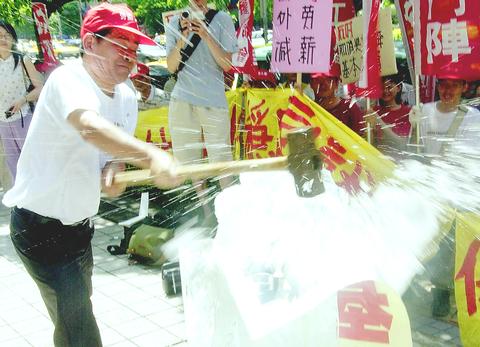A panel group under the Economic Development Advisory Conference has decided that a proposal to move to an hourly wage system is simply to hot to handle.
The proposal, called "no work, no pay," would have meant a huge reduction in pay for the nation's workers.
Labor groups were opposed to the measure because workers wouldn't receive compensation for their days off, as they do under the present system.

PHOTO: LIN CHENG-KUNG, TAIPEI TIMES
In addition, the labor panel said the minimum wage of NT$15,840 for both foreign and local workers should be kept. There were proposals earlier to do away with the wage guarantee.
"It's very difficult for one to survive on the current monthly minimum wage of NT$15,840," said Lin Hui-kwung (林惠官), president of the Chinese Federation of Labor and a participant on the employment panel. "Some workers have to support families on these wages."
Pai Cheng-sheng (
"Besides, if workers lack purchasing power, how can economic development be ensured?" Pai said.
Still, while the panel has taken a hands-off approach to the minimum wage for now, the group said it would urge the Council of Labor Affairs to consider adjusting it in the future.
But no specific proposal as to how the wage should changed was put forth.
For foreign workers, the panel put its weight behind a Council of Labor Affairs proposal to deduct food and rent allowances from their paychecks.
Chen Chu (
The government hopes to implement the plan in September, when NT$2,500 per month will be deducted from workers' paychecks, an amount that will eventually rise to NT$5,000.
By far the issue that had caused the biggest brouhaha yesterday was the proposal to move to an hourly pay system.
In January, a revised version of the Labor Standards Law was implemented, reducing working hours from 48 per week to 84 hours per fortnight.
Because workers are paid for their days off, the change meant that employees were getting an additional six paid hours off per week -- in effect a back-door pay raise.
To avoid giving workers more time off for the same amount of pay, some companies proposed moving to the hourly system.
Chen yesterday said she supported the idea, saying that it was an international trend.
But she later denied, however, that the council supported the shift after her comments angered labor movement officials.

ACTION PLAN: Taiwan would expand procurement from the US and encourage more companies to invest in the US to deepen bilateral cooperation, Lai said The government would not impose reciprocal tariffs in retaliation against US levies, President William Lai (賴清德) said yesterday, as he announced five strategies to address the issue, including pledging to increase Taiwanese companies’ investments in the US. Lai has in the past few days met with administrative and national security officials, as well as representatives from various industries, to explore countermeasures after US President Donald Trump on Wednesday last week announced a 32 percent duty on Taiwanese imports. In a video released yesterday evening, Lai said that Taiwan would not retaliate against the US with higher tariffs and Taiwanese companies’ commitments to

‘SPECIAL CHANNEL’: Taipei’s most important tasks are to stabilize industries affected by Trump’s trade tariffs and keep negotiations with Washington open, a source said National Security Council Secretary-General Joseph Wu (吳釗燮) arrived in the US for talks with US President Donald Trump’s administration, a source familiar with the matter said on Friday. Wu was leading a delegation for a meeting known as the “special channel,” the Financial Times reported earlier. It marked Trump’s first use of the channel since returning to the White House on Jan. 20. Citing a source familiar with the matter, the Financial Times reported that Minister of Foreign Affairs Lin Chia-lung (林佳龍) was also a part of the delegation. The visit came days after China concluded war games around Taiwan and amid Trump’s

Intelligence agents have recorded 510,000 instances of “controversial information” being spread online by the Chinese Communist Party (CCP) so far this year, the National Security Bureau (NSB) said in a report yesterday, as it warned of artificial intelligence (AI) being employed to generate destabilizing misinformation. The bureau submitted a written report to the Legislative Yuan in preparation for National Security Bureau Director-General Tsai Ming-yen’s (蔡明彥) appearance before the Foreign Affairs and National Defense Committee today. The CCP has been using cognitive warfare to divide Taiwanese society by commenting on controversial issues such as Taiwan Semiconductor Manufacturing Co’s (TSMC, 台積電) investments in the

HELPING HAND: The steering committee of the National Stabilization Fund is expected to hold a meeting to discuss how and when to utilize the fund to help buffer the sell-off The TAIEX plunged 2,065.87 points, or 9.7 percent, to close at 19,232.35 yesterday, the highest single-day percentage loss on record, as investors braced for US President Donald Trump’s tariffs after an extended holiday weekend. Amid the pessimistic atmosphere, 945 listed companies led by large-cap stocks — including Taiwan Semiconductor Manufacturing Co (TSMC, 台積電), Hon Hai Precision Industry Co (鴻海精密) and Largan Precision Co (大立光) — fell by the daily maximum of 10 percent at the close, Taiwan Stock Exchange data showed. The number of listed companies ending limit-down set a new record, the exchange said. The TAIEX plunged by daily maxiumu in just